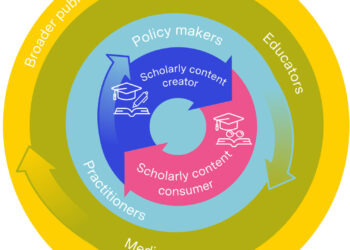
A memorable business conversation from more than a decade ago came to mind recently. The conversation was stimulated by an especially provocative individual at a journal known for its exacting editorial standards. This person asserted that refined and accurate information would be priced as luxury goods in the future.
As advertising has moved online, subscription prices have eroded, and other parts of the digital economy cemented themselves in place, he seems now to have been prescient, and on a large scale. We find ourselves facing simultaneously the two extremes of Stuart Brand’s famous dichotomy — “Information wants to be free; information wants to be expensive” — with “free” information increasingly substandard and subverted, while “expensive” information becomes unobtainable to many, either economically (e.g., Bloomberg terminals) or psychologically (i.e., they won’t pay for it because they’ve been conditioned not to pay for content). The resulting information imbalance is unhealthy for science, politics, economics, and society.
The situation around high-quality information brings to mind our food economy — fruits and vegetables are unobtainable to many not because they aren’t available, but because they are devalued when people lack time, cooking skills, and a context for long-term thinking about their health, or when advertising and food-industry-sponsored studies overwhelm our common sense with misinformation.
It is in this framework that the current age of information warfare is being fought, with most of the combatants vulnerable to free information manipulation because they have been conditioned to expect nothing better. Newspaper, journal, and magazine subscriptions are abandoned, libraries consistently receive a lower percentage of university spending, and publishers are blamed for increasing costs despite large increases in the number of scientists around the world producing results. Technophiles call for more free information, paid either up-front in a model that centralizes disbursements, caps price increases, supports larger, consolidated players, and hurts smaller, niche publishers, or, in mass media, via a model supported by advertisers and, in some cases, state sponsors.
As with food, cutting the supply lines on truth and facts during a time of information warfare is an excellent way to starve the opposition and secure victory through attrition.
Our current information space is economically enfeebled, with free information philosophies lowering barriers to entry so severely that the entire span can become one of the most effective propaganda platforms in human history. Examples of this enfeeblement and its consequences are immediately at hand:
- Sci-Hub, which demonstrates on many levels how disrespected intellectual property has become
- ISIS’ utilization of social media to recruit adherents across the globe
- The puzzling passivity in response to the annexation of Crimea to Brexit to Trump tying back to an activist Russian propaganda machine with newfound reach and penetration
- Russian hackers using academic emails to attempt to gain access to US think tanks immediately after the 2016 Presidential election
- The emergence of predatory scholarly journal publishers
Our society and institutions seem slow to believe that an open information platform filled with bad information and attention-driven economics might result in exploitation, bad decisions, and a lack of faith in our broader culture. Only recently did ISIS social media experts fall into the crosshairs of drones and snipers.
The Russians have a term for patsies who witlessly enable their programs — “useful idiots.” We tend to think of these as susceptible individuals who lack media sophistication and are easily swayed in their views. However, with the rise of Silicon Valley, which has broken many parts of our information economy, we may have learned that even useful idiots can scale via algorithms and flawed information economics.
If the results of such changes were positive, we’d call it “disruption.” However, when results lead to chaos, uncertainty, and the ability for other partisans to prevail because traditional defenses have been eroded, that’s “strife.” There is a difference, and strife’s uncertainty and unmoored economics make life easier for interlopers who want to undermine trust and avoid accountability.
Facebook itself might be seen an advertising-enriched useful idiot, as it represents much of the thinking in the Silicon Valley economy. This economy’s ideas and practices have wielded outsize influence, by diminishing the incentives for solid journalism, eroding the economic foundations of numerous localities, and undercutting intellectual property law traditions and standards when necessary. The shift of economic health in the US from the center to the coasts as a result of this new economy is a notable consequence, and driving through what the coasts refer to as “flyover country” provides plenty of visual evidence of the thoughtless decimation wrought by these economic assumptions.
Why not simply resist or refuse these economic assumptions? The will of Silicon Valley is enforced on the information economy in many ways, from trade embargoes (delisted in Google or Amazon if you don’t play ball) to factional groups bent on clouding and diminishing legal protections around information (Creative Commons).
But while it might be tempting to assert that firms like Facebook and Google are working to erode or supplant the role of the traditional publisher, editor, researcher, and journalist, they are just expressions of the underlying problem — the economics of free information.
In scholarly publishing, a similar set of assumptions have led directly to the predatory publisher, who could not have emerged in any significant quantity if the information they published required subscriptions. It’s only when publication shifts to revenues based on quantity (seller-controlled) rather than revenues based on quality and relevance (buyer-controlled) that predatory publishers emerge. The passivity exhibited by free information advocates toward predatory publishers underscores that the economic assumptions are, to some, unquestionable.
OMICS continues to serve as a useful measure of the problem. In August, OMICS was named in a complaint from the US Federal Trade Commission asserting it deceives scholars and misrepresents the editorial rigor of its journals. In September, investigative journalists at CTV News and the Toronto Star found that OMICS had purchased two of Canada’s largest medical science publishers — Andrew John Publishing and Pulsus Group. This led Suzanne Ketley, of Canadian Science Publishing, to compare the situation to the fake news situation emerging elsewhere:
It’s a bloody mess. Predatory publishers are appropriating journal names and editorial boards from reputable publishers, they are purchasing publishing houses, which leaves unsuspecting medical societies to then find legitimate publishing partners, and they continue to publish fake science authored by fake researchers that has undergone absolutely no review.
Google has interesting roles in degrading the economics of information — through its advocacy work, its search algorithms, and its advertising business. Google Scholar has been known to put science and scholarship that is free above the actual Version of Record for months on end, claiming this is a bug in statements that seem somewhat unsatisfying. Google has also played a role in the emergence of Creative Commons, an organization I’ve outlined as redundant, expensive, and senseless, with Google’s goal apparently to make copyright somewhat less of a problem as it pursues its business goals. There is the Google Books situation, which also says something about how Google views information — as something to ingest into its advertising engine. Finally, there is the judgment-free basis of Google AdWords itself, which feeds any content beast capable of generating traffic and clicks. This means that to make money in the free information economy, it makes sense to cater to the most aggrieved part of society, even with lies. As one fake news purveyor said in a recent story:
[Trump supporters are far more receptive] because they are angry. For me, this is all about income, nothing more.
That last sentence might nicely summarize Silicon Valley economics. Predatory publishers who collect APCs whether an article is factual or not are spun from similar cloth.
You can find predatory publishers in Google Scholar, which aims to be comprehensive, and because predatory publishers are almost by definition OA publishers, their free content is preferred over paywalled content, making Google Scholar an interesting search engine — one that prefers preliminary and predatory content to final, paywalled content, simply because of the economics.
In the face of all of these cultural and economic warning signs, we continue to shy away from the nasty paywall, even though the metaphor is faulty — is a movie ticket a “paywall”? — and despite the increasing prevalence of subscriptions in industries Silicon Valley once tried to gut, from television to film to music. Thanks to subscriptions, organizations new and old, small and large, once again have a means to survive and compete. Netflix, Amazon, and HBO are putting forth some of the best original programming on the planet, thanks to the subscription model. Box service subscriptions (e.g., Blue Apron, Birchbox) are so popular they have spawned a review site called MySubscriptionAddiction. Almost as a reaction, after the 2016 election, subscriptions to the New York Times increased by 41,000. Other paid news outlets — the Wall Street Journal, Pro Publica, the Washington Post — witnessed similar increases.
The long-standing and continued embrace of the subscription model seems a clear indication that the model is not anathema to customers. In fact, moving away from advertising-based and supply-side purchasing back to something weighted more to the demand side can solve a number of economic problems, mainly by aligning the interests of the producers and the consumers of information more clearly.
Subscriptions can co-exist well with free information and with advertising. Having a subscription model at its heart allows information businesses like ESPN to offer high-quality free information. Most publishers offering OA journals today can do so because their subscription businesses subsidize their OA offerings. And advertising that is controlled to ensure a subscription audience is not misled or angered can actually provide a small level of information and service.
But having accountability at the head is important for a blend of advertising and subscriptions. OMICS and other publishers like them have a model with low or no accountability. The recent introduction of an editor-in-chief at PLOS ONE indicates to me an attempt at introducing accountability for a megajournal, something not all in the class manage. But chasing accountability in an economic model that is built on misaligned incentives — accuracy as a luxury item, quantity over quality, and free information theories — only underscores that we need a better economic theory for information.
The problems with the lack of accountability are clear from analyses of the “fake news” phenomenon, from the unknown people behind the slander of Comet Ping-Pong, a DC neighborhood pizzeria portrayed as running a child-slavery racket for Hillary Clinton, to the fake news factory portrayed in a recent New York Times profile of a hacker bent only on making advertising income from false click-bait stories, the lack of a direct connection between information consumer and producer clearly gives room and rise to the introduction of pernicious falsehoods. These people owe me a refund. Oh sorry, no subscription model, so no financial accountability.
The ultimate irony here is that the subscription model, which spreads costs more widely and fairly with consent and accountability, isn’t viewed by Silicon Valley’s “free information” ethos as a valid option worthy of support and propagation. Google tilts against it. Facebook won’t adopt it. Twitter won’t save itself with it. It’s not in their economic interest to have information presented online under subscription terms. The result of this Silicon Valley economic argument? An anti-subscription mindset around words and basic information that seems immovable. As a result, our economic borders are not naturally repelling information warriors.
Until that changes, good information will continue to either move into the luxury zone or cease to exist altogether, a casualty of implementing unrealistic and impractical information economy philosophies or outright information warfare. Meanwhile, the quality and reliability of free information will continue to fall, media fragmentation will continue to grow, and a shared understanding of the world will become more elusive. In this way, the economic assumptions of “free information” themselves serve as the ultimate useful idiocy in the information wars — whereas others in the conflict might see our lack of economic discipline as a sign that we’ve given up already, or are simply so vulnerable to misinformation the battle becomes child’s play.
Discussion
10 Thoughts on "Economics, Silicon Valley, and Information Warfare — Is Accuracy Becoming a Luxury Item? Or a Casualty?"
A timely and perceptive analysis, Kent! Thank you!
The barriers to entry for predatory publishers and false news sites are very low. Economics 101 says that as more learn of their profits, competitors will rush in. We are about to see the internet awash in an ocean of false information. It’s difficult to see how Google’s searches can remain effective in this type of environment. If one has to scroll down three pages before finding a source that can be believed, sophisticated users will seek out other search options, perhaps one that prioritizes subscriptions.
So would this post be more or less trustworthy if the SK were subscription-based rather than freely available to readers?
It’s an interesting question. As I said, the subscription model can be deployed in a number of ways, and free information is not incompatible with it. Some people are missing that point. However, since the SSP is a membership organization, there is a funding entity behind the SK, and the success of the SK has led to an increase in SSP memberships (this was especially noticeable in the blog’s early years). Also, there is accountability, which social media largely lacks. There is an Editor-in-Chief (David Crotty), and an SSP Committee that oversees the Scholarly Kitchen. As writers, we have a lot of latitude, but I’ve had posts sent down the tubes before because the EIC saw a fatal flaw. I have no problem with that. I’m accountable to him, he’s ultimately accountable to the publisher (the SSP) of the blog, and the SSP is accountable to its paying members. It’s a variant on the subscription model. Free information can ride alongside in a paid model.
Well that’s an answer, but it doesn’t answer the question – it just muddles the issue at hand. Ultimately, it’d be the same post either way, and thus equally trustworthy, wouldn’t it?
It is an interesting question, with interesting implications on the whole subscription-based vs. free argument you’re making.
Assuming that trustworthiness is a probability of some kind, then in one sense Kent’s answer is a good one.
If the results were broken into statements that are either true or false, then each post (idealizing a bit) has a percentage of true statements. Then the same post is “equally trustworthy” regardless as how it is generated. In the same way, a sample might be representative despite not being generated randomly.
But Kent is treating SK as a process for generating content. If SK is a content-generating process, then its overall reliability depends on the process. Kent is saying that the process has some editorial checks. These presumably increase the percentage of true statements above that produced by the individual reliability and knowledgeability of the authors.
Another way of evaluating trustworthiness is each reader’s Bayesian prior degree of belief for SK articles.
If SK is treated as a process or as having a Bayesian prior degree of belief, then the same post is *not* equally trustworthy regardless of how it is generated.
Kent’s answer essentially argues that SK is somehow subscription-based and presumably trustworthy by virtue of its ties to SSP, and having an EiC. Regardless of verbal gymnastics, SK is in fact free information.
But overall you nailed it – trustworthiness is a probability and should be treated as such. The main post treats it rather binary, though: free information equals ISIS, KGB, and predatory journals; meanwhile, paid information is immaculate in its reliability and trustworthiness.
Whether free or paid, simplifying a complex issue in that manner doesn’t seem trustworthy at all.
You’re actually the one oversimplifying. In the post, I mention that free information and subscriptions can co-exist. What matters is accountability, and an economic model that has users paying tends to cultivate more accountability. SSP has members paying, but membership and subscription are often conflated or blended in the market. The main point is that the membership structure has created accountability structures that are tied economically to the core paying base.
In the post, I was careful not to be too binary. The main point is that if you use information that’s flawed and then can’t economically punish anyone for purveying it, that will lead to lower accountability. Sometimes, that accountability seems almost zero. Subscriptions/memberships don’t guarantee accountability, but they tend to naturally cultivate it.
Excellent and timely! I hope intermediaries will play a role in educating the people to differentiate between good and bad information.
I think your comparison to the food economy is apt, but you leave out an important part of it: Not everyone does have access to fruits and vegetables. And just as there are food deserts, there are information deserts, where many people not only can’t afford subscription-based content but lack the ICT to access it (almost a quarter of US households don’t have a high-speed Internet connection, according to the US Census). How do we ensure that the high-quality information we produce as academics and scholarly publishers doesn’t get locked behind an ivory paywall? Rather than bemoaning Facebook and Google, are there ways that we can game the system in favor of reliable information?



